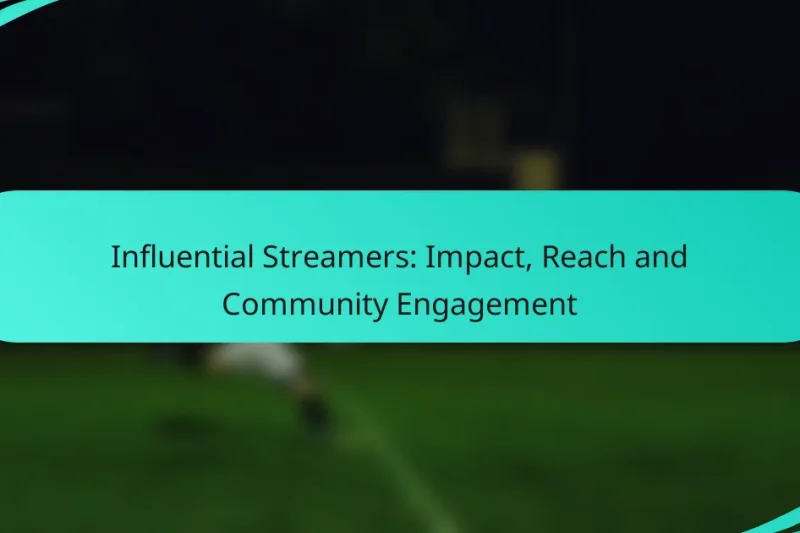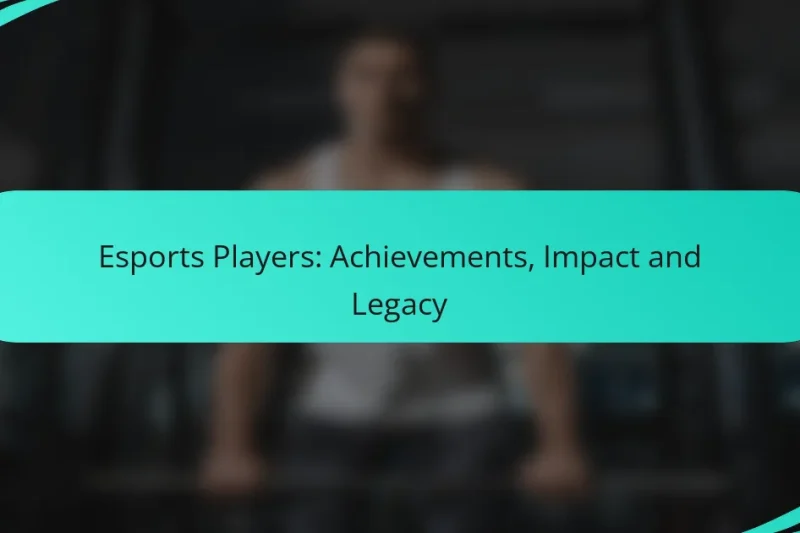Player profiles highlight the journeys of legendary athletes, rising stars, and impactful figures in sports, showcasing … Player Profiles: Legends, Rising Stars and ImpactRead more
Esports History and Player Profiles: Notable Esports Players
Esports has evolved into a prominent facet of modern entertainment, largely due to the remarkable contributions of notable players who have left an indelible mark on the competitive gaming landscape. These individuals have not only achieved impressive milestones and championship titles but have also influenced the growth of the esports industry, shaping its culture and community. Their skills and dedication continue to inspire aspiring gamers and elevate the status of esports worldwide.
Player Transfers: Impact on Team Dynamics and Performance
Player transfers play a crucial role in shaping team dynamics and overall performance in sports. By … Player Transfers: Impact on Team Dynamics and PerformanceRead more
Female Esports Players: Journey, Challenges and Achievements
Female esports players are making their mark in a traditionally male-dominated arena, facing unique challenges such … Female Esports Players: Journey, Challenges and AchievementsRead more
Influential Streamers: Impact, Reach and Community Engagement
Influential streamers play a crucial role in shaping community engagement within the gaming landscape, creating interactive … Influential Streamers: Impact, Reach and Community EngagementRead more
Coaches: Role in Player Development and Success
Coaches are pivotal in shaping the development and success of players, particularly in the UK, where … Coaches: Role in Player Development and SuccessRead more
Player Personalities: Influence on Fan Engagement
Player personalities play a crucial role in shaping fan engagement by fostering emotional connections between athletes … Player Personalities: Influence on Fan EngagementRead more
Esports Players: Achievements, Impact and Legacy
Esports players have made remarkable contributions to the gaming industry, achieving significant milestones such as world … Esports Players: Achievements, Impact and LegacyRead more
Who are the most notable esports players in history?
The most notable esports players in history are those who have significantly impacted their respective games and the esports scene as a whole. Their achievements, skills, and influence have shaped the competitive landscape, making them legends in the gaming community.
Faker (Lee Sang-hyeok) – League of Legends
Faker, known as the “Unkillable Demon King,” is widely regarded as the greatest League of Legends player of all time. His exceptional mechanics and strategic mind have led his team, T1, to multiple World Championship titles, solidifying his legacy in the esports world.
Faker’s playstyle is characterized by his versatility, allowing him to excel with a wide range of champions. His ability to adapt to different meta shifts and his consistent performance in high-pressure situations make him a role model for aspiring players.
Bugha (Kyle Giersdorf) – Fortnite
Bugha gained fame after winning the Fortnite World Cup in 2019, where he showcased his incredible building and shooting skills. His victory not only earned him a substantial cash prize but also established him as a top player in the Fortnite community.
Known for his calm demeanor and strategic gameplay, Bugha has become an influential figure in esports, inspiring many young gamers. His success has led to numerous sponsorships and opportunities, highlighting the potential for competitive gamers to thrive in the industry.
Daigo Umehara – Street Fighter
Daigo Umehara, often referred to as “The Beast,” is a legendary figure in the fighting game community, particularly known for his mastery of Street Fighter. His iconic comeback against Justin Wong at EVO 2004 is considered one of the greatest moments in esports history.
Daigo’s dedication to the craft and his innovative techniques have set a high standard for competitive play. He continues to compete at a high level while also contributing to the community through streaming and content creation.
Ninja (Tyler Blevins) – Fortnite
Ninja is one of the most recognizable names in gaming, known for his vibrant personality and exceptional Fortnite skills. His rise to fame was fueled by his engaging streams and participation in high-profile tournaments, making him a household name.
Beyond his gaming prowess, Ninja has leveraged his popularity to become a brand ambassador and influencer, collaborating with various companies. His success illustrates the potential for gamers to expand their careers beyond just competition.
Simple (Oleksandr Kostyliev) – CS:GO
Simple is renowned as one of the best players in Counter-Strike: Global Offensive (CS:GO), known for his incredible aim and game sense. His performances with Team Natus Vincere (Na’Vi) have earned him numerous accolades, including multiple MVP awards at major tournaments.
Simple’s aggressive playstyle and ability to make clutch plays under pressure have made him a fan favorite. His dedication to improving his skills and his impact on the CS:GO scene exemplify what it takes to be a top-tier esports athlete.
What are the key achievements of notable esports players?
Notable esports players have achieved significant milestones that highlight their skill and dedication. These achievements often include championship titles, record-breaking performances, and influential contributions to their games and communities.
Faker’s World Championships
Lee Sang-hyeok, known as Faker, is celebrated for his remarkable success in League of Legends, having won three World Championships from 2013 to 2015. His strategic gameplay and exceptional mechanics have made him a legendary figure in esports.
Faker’s influence extends beyond his victories; he has shaped the competitive landscape of League of Legends and inspired countless players worldwide. His consistent performance at the highest level sets a benchmark for aspiring esports athletes.
Bugha’s Fortnite World Cup victory
Kyle Giersdorf, known as Bugha, gained fame by winning the Fortnite World Cup in 2019, securing a prize of $3 million. His victory showcased not only his skill but also his ability to perform under immense pressure in a highly competitive environment.
Bugha’s success has made him a prominent figure in the Fortnite community, and he continues to influence the game through his streams and participation in various tournaments. His achievement highlights the potential for young players to excel in esports.
Daigo’s EVO championships
Daigo Umehara, often referred to as “The Beast,” is renowned for his multiple championships at the Evolution Championship Series (EVO), particularly in Street Fighter. His iconic moments, such as the “Daigo parry,” have become legendary in fighting game history.
With several EVO titles to his name, Daigo has not only demonstrated exceptional skill but has also contributed to the growth of the fighting game community. His legacy continues to inspire new generations of players.
Ninja’s Twitch milestones
Tyler Blevins, known as Ninja, achieved significant milestones on Twitch, including being one of the first streamers to reach over 10 million followers. His engaging personality and gameplay in Fortnite helped popularize streaming as a career.
Ninja’s success on Twitch has paved the way for many content creators, demonstrating the potential for esports players to build personal brands and connect with audiences. His influence extends beyond gaming, impacting pop culture and media.
Simple’s CS:GO Major wins
Oleksandr Kostyliev, known as s1mple, is recognized for his outstanding performances in Counter-Strike: Global Offensive, particularly his Major tournament victories. His skill and precision have earned him numerous accolades, including the title of the best player in the world.
s1mple’s achievements in CS:GO highlight the importance of individual talent in team-based games. His dedication to improving his gameplay serves as a model for aspiring players looking to excel in competitive esports.
How have esports players influenced the gaming industry?
Esports players have significantly shaped the gaming industry by elevating competitive gaming to mainstream entertainment. Their influence extends to visibility, streaming platforms, and game development, driving growth and innovation in the sector.
Increased visibility for competitive gaming
Esports players have brought competitive gaming into the spotlight, attracting millions of viewers worldwide. Major tournaments, often held in large arenas, showcase top talent and provide a platform for players to gain recognition.
This visibility has led to increased sponsorship opportunities and partnerships with brands, further legitimizing esports as a viable career path. As a result, more players aspire to compete professionally, fueling the growth of the esports ecosystem.
Growth of streaming platforms like Twitch
The rise of esports players has propelled streaming platforms, particularly Twitch, to new heights. Players often stream their gameplay live, allowing fans to engage with them directly and fostering a sense of community.
These platforms have become essential for player branding and monetization, with many players earning significant income through subscriptions, donations, and sponsorships. This shift has made streaming an integral part of the gaming experience, influencing how games are marketed and consumed.
Impact on game development and marketing
Esports players have influenced game development by providing feedback that shapes gameplay mechanics and features. Developers increasingly consider competitive balance and spectator appeal when designing games, aiming to create titles that are engaging for both players and viewers.
Marketing strategies have also evolved, with game publishers leveraging esports events and player endorsements to reach wider audiences. Collaborations with popular players can enhance a game’s visibility and drive sales, making player influence a key factor in the success of new releases.
What are the career paths for aspiring esports players?
Aspiring esports players can pursue various career paths, including joining professional gaming teams, creating content, and taking on coaching roles. Each path offers unique opportunities and challenges, allowing players to leverage their skills in different ways.
Professional gaming teams
Joining a professional gaming team is one of the most recognized career paths for esports players. This typically involves rigorous training, participation in tournaments, and collaboration with teammates to enhance skills. Players often start by competing in local or online tournaments to gain visibility and experience.
Consider the commitment required, as professional players often train for several hours daily. Additionally, securing a spot on a team may involve networking within the gaming community and showcasing talent through gameplay streams or competitions.
Content creation and streaming
Content creation and streaming have become popular avenues for esports players, allowing them to build personal brands and engage with fans. Players can stream their gameplay on platforms like Twitch or YouTube, offering live commentary, tutorials, or entertainment.
Success in this area often depends on consistency and audience engagement. Players should focus on creating unique content that resonates with viewers, such as gameplay highlights, educational videos, or entertaining challenges. Monetization can come from subscriptions, sponsorships, and ad revenue.
Coaching and mentorship roles
Coaching and mentorship roles are essential for developing the next generation of esports talent. Experienced players can transition into coaching positions, guiding teams or individual players in strategy, mechanics, and mental preparation.
To succeed in coaching, one must possess strong communication skills and a deep understanding of the game. Coaches often analyze gameplay footage, provide feedback, and develop training regimens tailored to players’ needs. This role can be rewarding both financially and personally, as it allows former players to stay connected to the esports community while shaping future stars.






